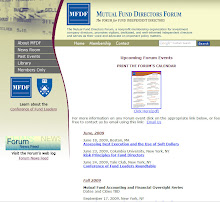The staff of the SEC has granted Citigroup Global Markets ("Citigroup") no-action relief allowing them to offer to Rule 2a-7 money market funds the opportunity to invest in Window Variable Rate Demand Bonds ("WVRDBs"). These bonds, used by municipalities having at least an A-rating and the highest short-term rating for access to the variable rate market, are typically issued in series and each series has a long-term stated maturity of 30 years, with a weekly interest rate reset. WVRDBs also have a “dual put” feature, which will allow an investor, at its sole option, to tender a WVRDB for purchase (i.e., remarket) within a fixed period of time not to exceed 397 calendar days (i.e., 13 months) in any case. The WVRDB may be disposed of within 30 days after notice through the remarketing effort.
According to Citigroup, as a result of the disruption in the traditional variable bond market, it has become substantially more difficult for municipal issuers in particular to issue and maintain existing variable rate bond programs. Further, the disruption in the variable bond market has imposed significant hardship on money market funds, because the number of appropriate investments available for money market funds has decreased dramatically, while the amount of money flowing to money market funds has considerably increased as investors have allocated more of their portfolios away from equity securities.
WVRDBs are designed to be treated as a “Long-Term Variable Rate Security” under paragraph (d)(3) of Rule 2a-7 of the Ivestment Company Act, under which money market mutual funds operate. The rule defines a "long-term variable rate security" as one having a maturity that is the longer of (a) the period until the next interest reset date and (b) the period remaining until the principal amount may be recovered on demand. Rule 2a-7 also defines a Demand Feature as on that must must be exercisable either (i) “at any time on no more than 30 calendar days’ notice” or (ii) “at specified intervals not exceeding 397 calendar days and upon no more than 30 calendar days’ notice.”
The "dual put" feature of a WVRDB raises a concern because the gap before the ultimate repurchase of the securities is inconsistent with the literal “30 calendar days’ notice” language of the Rule. The Commission Staff, however, agreed that the purpose of the thirty-day notice period was to address portfolio liquidity. Citigroup argued, and the Commission Staff agreed, that the “dual put” feature will not reduce fund liquidity, but rather, may enhance liquidity by providing an investment which will likely be remarketed in 30 days and will almost certainly be repurchased within seven months of notice.
The Commission Staff granted the no-action relief if the fund acquires and treats a WVRDB as a “Long Term Variable Rate Security” for the purposes of paragraph (d)(3) of Rule 2a-7 under the 1940 Act, provided that the fund complies in all other respects with Rule 2a-7.
The full text of the Citigroup no-action letter and application is available at: http://sec.gov/divisions/investment/noaction/2009/citigroupglobal052809-2a7-incoming.pdf
According to Citigroup, as a result of the disruption in the traditional variable bond market, it has become substantially more difficult for municipal issuers in particular to issue and maintain existing variable rate bond programs. Further, the disruption in the variable bond market has imposed significant hardship on money market funds, because the number of appropriate investments available for money market funds has decreased dramatically, while the amount of money flowing to money market funds has considerably increased as investors have allocated more of their portfolios away from equity securities.
WVRDBs are designed to be treated as a “Long-Term Variable Rate Security” under paragraph (d)(3) of Rule 2a-7 of the Ivestment Company Act, under which money market mutual funds operate. The rule defines a "long-term variable rate security" as one having a maturity that is the longer of (a) the period until the next interest reset date and (b) the period remaining until the principal amount may be recovered on demand. Rule 2a-7 also defines a Demand Feature as on that must must be exercisable either (i) “at any time on no more than 30 calendar days’ notice” or (ii) “at specified intervals not exceeding 397 calendar days and upon no more than 30 calendar days’ notice.”
The "dual put" feature of a WVRDB raises a concern because the gap before the ultimate repurchase of the securities is inconsistent with the literal “30 calendar days’ notice” language of the Rule. The Commission Staff, however, agreed that the purpose of the thirty-day notice period was to address portfolio liquidity. Citigroup argued, and the Commission Staff agreed, that the “dual put” feature will not reduce fund liquidity, but rather, may enhance liquidity by providing an investment which will likely be remarketed in 30 days and will almost certainly be repurchased within seven months of notice.
The Commission Staff granted the no-action relief if the fund acquires and treats a WVRDB as a “Long Term Variable Rate Security” for the purposes of paragraph (d)(3) of Rule 2a-7 under the 1940 Act, provided that the fund complies in all other respects with Rule 2a-7.
The full text of the Citigroup no-action letter and application is available at: http://sec.gov/divisions/investment/noaction/2009/citigroupglobal052809-2a7-incoming.pdf





